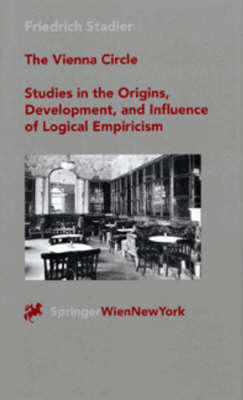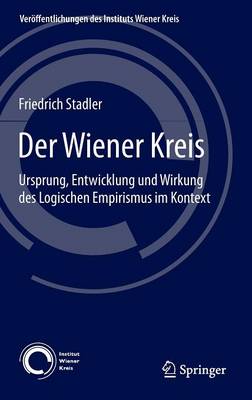Veroeffentlichungen Des Instituts Wiener Kreis
2 primary works
Book 2
The Vienna Circle - Studies in the Origins, Development, and Influence of Logical Empiricism
by Friedrich Stadler
The author has unearthed previously unpublished archival material, which he uses together with recent literature, to refute a number of widespread cliches about "logical positivism".
Following some metatheoretical and methodological remarks on the troubled relation between the history of science and the philosophy of science, the author offers an accessible introduction to the complex subject of "scientific philosophy". At the same time he provides a detailed account of the socio-cultural background of the so-called "rise of scientific philosophy".
The central section of the book focuses on the intellectual setting of "late enlighten-ment". Here the author analyzes the dynamic of the Schlick Circle and presents extensive archival material related to the Unity of Science conferences that took place between 1929 and 1941.
Stadler then introduces some of the leading intellectuals of the Schlick Circle and its periphery. Karl Menger's "Mathematical Colloquium" is also documented here for the first time. The author then describes the relations between Moritz Schlick and Otto Neurath, the Vienna Circle and Ludwig Wittgenstein as well as between the Heinrich Gomperz Circle and Karl Popper. The first publication of the protocols of the Schlick Circle and of an interview with Karl R. Popper completes these studies. The final chapter of this section describes the de-mise of the Vienna Circle and the forced exodus of scientists and intellectuals from Austria.
The second part of the book includes a bio-bibliographical documentation of the activities of the Vienna Circle and of the assassination of Moritz Schlick and an appendix comprising an extensive list of sources and literature.
In this book, the author presents an exemplary study of the rise of scientific thought and its vicissitudes in this century.
Book 20
Die zweite Auflage dieses inzwischen vergriffenen Buches (1. Auflagen Suhrkamp 1997/2001) stellt die einzige Gesamtdarstellung und Dokumentation des Wiener Kreises im historischen Kontext dar. Es liefert eine wissenschaftsgeschichtliche und systematische Untersuchung zum Logischen Empirismus des Wiener Kreises, der bis heute als bahnbrechende Strömung wissenschaftlicher und analytischer Philosophie eine internationale Berühmtheit erlangt hat.
Nach der Vorgeschichte des Wiener Kreises in der Monarchie wird das geistige Umfeld der „Spätaufklärung“ in der Ersten Republik als Grundlage für die Entwicklung des Schlick-Zirkels (mit der Publikation der Protokolle), sowie des Vereins Ernst Mach und Karl Mengers Mathematisches Kolloquium dargestellt. Die interne und externe Entwicklung dieser Gruppe wird bis zum „Anschluss“ 1938 beschrieben, die einerseits durch einen blühenden Aufstieg mit wachsender Anerkennung im Ausland, andererseits durch die Vertreibung aus ihrer Heimatstadt charakterisiert ist. Dabei wird auf der Basis von Primärquellen das Verhältnis des Wiener Kreises zu den wichtigsten Bezugspersonen wie Ludwig Wittgenstein, Heinrich Gomperz und Karl Popper (mit einem Interview) neu dargestellt, sowie der Pluralismus des Kreises am Beispiel von Otto Neurath und Moritz Schlick illustriert.Der dokumentarische Teil bietet eine biografische und bibliografische Gesamtschau des Wiener Kreises und seiner Peripherie auf dem aktuellsten Stand der Forschung sowie die erste quellenorientierte Dokumentation zur folgenreichen Ermordung von Moritz Schlick im Jahre 1936.Das Buch stellt ein Standardwerk zur Geschichte des Wiener Kreises dar, der für die damalige europäische Wissenschaftsphilosophie und ihre Wirkung in der heutigen analytischen philosophy of science exemplarisch ist.

